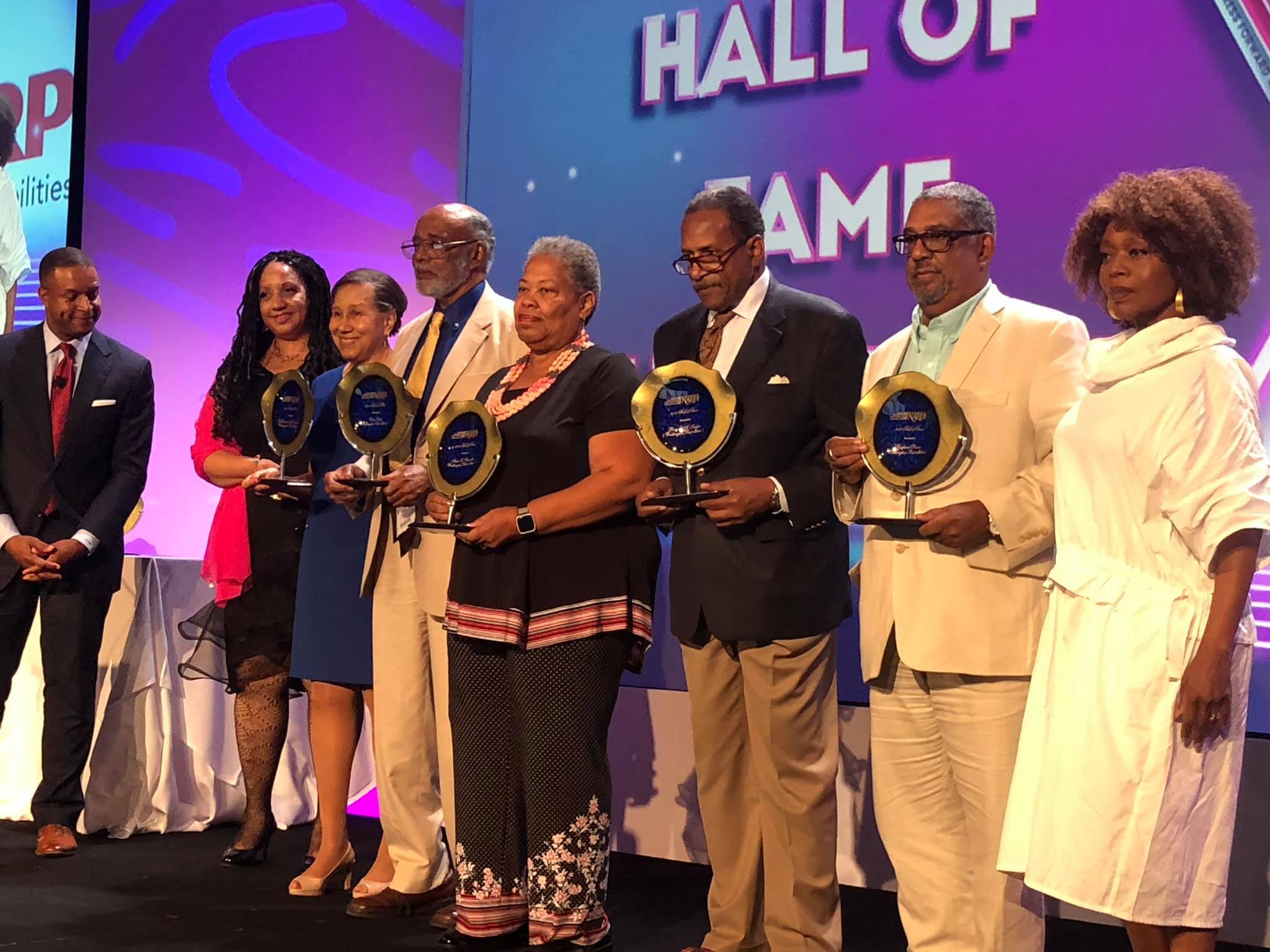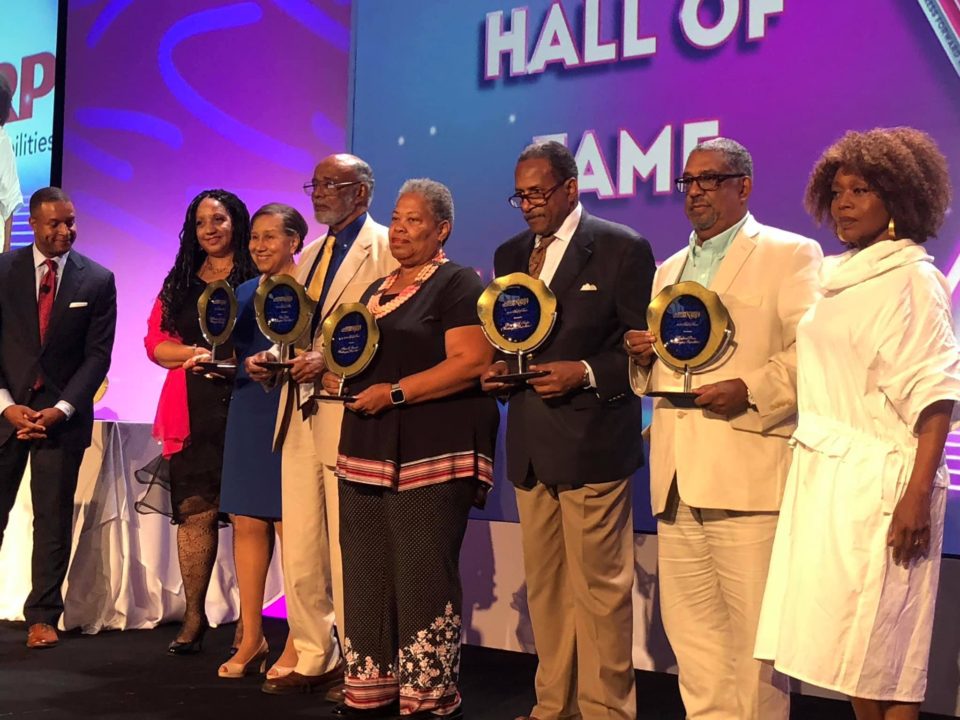‘They Stayed Afloat on the Battlefield’
Leon Dash Accepts the Honor for the Seven
Sarah Glover, NABJ President, on Stepping Up
- NABJ’s Tucker ‘Out Hustled’ Competitors (new web page)
- With Millennials the Focus, NABJ Demolishes Attendance Records (new web page)

‘They Stayed Afloat on the Battlefield’
The Washington Post Metro Seven were inducted into the Hall of Fame of the National Association of Black Journalists on Aug. 9, 2019, at a luncheon honoring other top award winners and Hall of Fame inductees.
NABJ President Sarah Glover told the luncheon audience at the Aventura, Fla., convention near Miami, “This is exactly what excellence and success looks like. One of the first words that came to mind as these outstanding journalists were being inducted into our Hall of Fame is courage. During our convention this week, we have been focused on the true meaning of our theme, ‘Fight the Power, Press Forward With Passion and Purpose.’ These living legends epitomize the true meaning of our theme.”
Co-hosts were Craig Melvin of NBC News and actress Alfre Woodard.
Miss America 2019, Nia Franklin (video), provided the opening entertainment, singing “This Is Me.” Black women hold the Miss USA, Miss Teen USA and Miss America titles simultaneously for the first time.

The honorees were:
- Sheila Brooks, Ida B. Wells Award. Founder of the NABJ student projects, Brooks invoked her mother and Harriet Tubman.
- James A. Washington, Legacy Award. Publisher of the Dallas Weekly and president and general manager of the Atlanta Voice, Washington praised linkages between journalists in the mainstream and the black press and urged, “Do not let the job define who you are.”
- Wanda Lloyd, Hall of Fame. Diversity advocate and retired media executive and author of a forthcoming memoir, “Coming Full Circle: Jim Crow to Journalism,” Lloyd cautioned, “People are watching you,” whether you realize it or not.
- Garry D. Howard, Hall of Fame. First African American president of the Associated Press Sports Editors and, while at the Milwaukee Journal, the only African American sports editor at a major daily, Howard said, “I’ve always believed I was the master of my fate and captain of my soul; you can be, too.”
- Washington Post Metro Seven, Hall of Fame. Greg Morrison, NABJ treasurer, volunteered in an email after the convention, “the story of the Metro Seven provided many millennials and Gen Xers a frame of reference to the access available to them today. We had a total of 4129 people there to carry on the legacy of the Founders and The Metro Seven. You should be proud of your role in that.”
- Bob Black, Hall of Fame. The longtime Chicago photographer said it wasn’t about what outlet employed you; he worked with others to found the Chicago Alliance of African American Photographers.
- “Fly Jock” Tom Joyner, Hall of Fame. The radio man who started the “Tom Joyner Morning Show” 25 years ago and is retiring this year said his hero was the late John H. Johnson, founder of Ebony magazine, whose mission of serving the African American community Joyner said he shares. Joyner said he would continue to help students at historically black colleges and universities through the Tom Joyner Foundation. Luncheon co-host Craig Melvin said, “There are literally thousands of children who would not have gone to college had it not been for Tom Joyner.”

Leon Dash Accepts the Honor for the Seven
First, the Metro Seven thanks the NABJ for the incredible honor of being inducted into the organization’s Hall of Fame. We are called the Metro Seven because in 1972 we were all reporters on the Washington Post’s Metropolitan Desk.
Next, I’d like to introduce the four Metro Seven members who are attending. LaBarbara (Bobbi) Bowman, Ivan C. Brandon, Ronald (Ron) Taylor, and myself, Leon Dash.
Missing today Metro Seven member Richard (Scoop) Prince. Many of you know him from his online publication Journal-isms, a column that weekly deals with issues of diversity and minority inclusion in every aspect of contemporary journalism — newspapers, digital media, broadcast and audio. Unfortunately, a personal emergency has kept him from attending. He asked that we inform our younger colleagues, some of whom were not yet born in 1972, that you respond to him when he calls you.
He is not calling you for some idle reason, but rather to reflect in his column contemporary issues of diversity and inclusion. Scoop Prince put together our application for induction into the Hall of Fame and we are deeply disappointed he is not here with us today.
Penny Mickelbury, who today is a successful playwright and mystery novelist, cannot be here today because of professional commitments.
And on a sad note, Metro Seven member Mike Hodge, who pursued a successful acting career, died on Sept. 9, 2017, in New York City. At the time of his death, Mike was president of the New York chapter of SAG-AFTRA, the union that nationwide represents 160,000 actors, announcers, broadcast journalists, news writers and news editors.
[At this point, I added extemporaneously that Mike was the courtroom judge in the trial of a corrupt New York City policeman in an old “Law & Order” program I had watched on my hotel’s television the night before.] We miss you, Mike!
Lastly, we give a heartfelt thank you to our attorney, Clifford Alexander Jr., who guided and advised the Metro Seven for months as our pro bono legal counsel.
At this point, I will quote from the top of our statement when we opened our press conference on the morning of March 23, 1972, at the historic Metropolitan AME Church. We’d like you to reflect on what progress has been made in the 47 years since and what is left yet to be done.
“Today, we, seven black reporters for the Washington Post, filed a complaint with the U. S. Equal Employment Opportunity Commission, charging the Washington Post with ‘denying black employees an equal opportunity with respect to job assignments, promotional opportunities, including promotions to management positions, and other terms and conditions of employment. These and other practices have operated to substantially exclude black employees from supervisory and higher paying positions and those assignments which would enhance their professional growth and progression.’ ”
I would like to point out that at no point in the several bargaining sessions with newsroom management or after filing of the complaint did we ask for or seek salary increases. Our goal was to increase the hiring of black journalists throughout the newsroom.
In November 1972, after a seven-month investigation, the EEOC issued a report that stated, in part, “there is reasonable cause to believe” that The Post “has engaged in unlawful employment practices” as charged by the seven black reporters. After the public [notice] was issued, The Post embarked on a program of hiring and promotion of journalists of color.
Lastly, I’ve been instructed by Bobbi Bowman here to end with this thought: We emphasize that diversity is about accuracy, which is the core of what we do as journalists.
We thank you!
Text provided by Leon Dash.
- Oswald Brown, Bahamas Chronicle: Professor Leon Dash and His Contributions to Journalism in the Bahamas
- Journal-isms: 500 Celebrate Life of Mike Hodge, Journalist Turned Actor and Union Activist (Oct. 19, 2017)
A video of the Hall of Fame luncheon includes the Metro Seven from 1:48 to 1:59:48. (Credit: YouTube)
Sarah Glover, NABJ President, on Stepping Up
This is exactly what excellence and success looks like. One of the first words that came to mind as these outstanding journalists were being inducted into our Hall of Fame is courage. During our convention this week, we have been focused on the true meaning of our theme, “Fight the Power, Press Forward With Passion and Purpose.” These living legends epitomize the true meaning of our theme.
Our inductees succeeded despite the turbulent times in society and in their newsrooms and media organizations. They stayed afloat on the battlefield, recognizing what is right and what would one need to do to defeat what is wrong. They pursued their goals to rise to the pinnacle of their careers despite naysayers . . . . We’re really good at being naysayers sometimes. NABJ family and friends, we are witnessing and regognizing today the fruit from all of that labor, and the commitment of our founders, all 44 of them, and that of thousands of like-minded colleagues who have refused to accept the status quo.
To create the professionals we are today and who we are honoring today, somebody had to make a sacrifice. Somebody had to endure some pain and some discomfort. Somebody had to take some backlash, isolation, ridicule. You have to remember those days. Some had to risk promotion, pay increases, and even assigned or not assigned to a top-breaking news story. Some of those outspoken, courageous colleagues were sent into obscurity instead of the Metro desk, the national desk, the foreign desk, where journalists were needed to put the spotlight on issues impacting our people.
They were overlooked for the special projects, for those investigative teams, or the elections teams. When the anchor, the correspondent, or the bureau chief position became vacant, they were not called upon to fill it because they were viewed as troublemakers. These journalists were not viewed as team players, but difficult to work with.
Some of you can relate to that in this room. There had to be some tough days for the Washington Post Metro Seven. They stepped up and spoke out against their management, and during that era, that was real courage. That was bravery, that was self-sacrifice, and that is acknowledged today because this is a battle that journalists are fighting today as well.
How many of you still know colleagues who are being underpaid? And who are experiencing other injustices in the newsroom and in other media organizations? . . .
Also:

